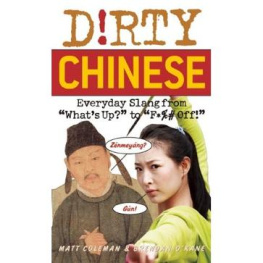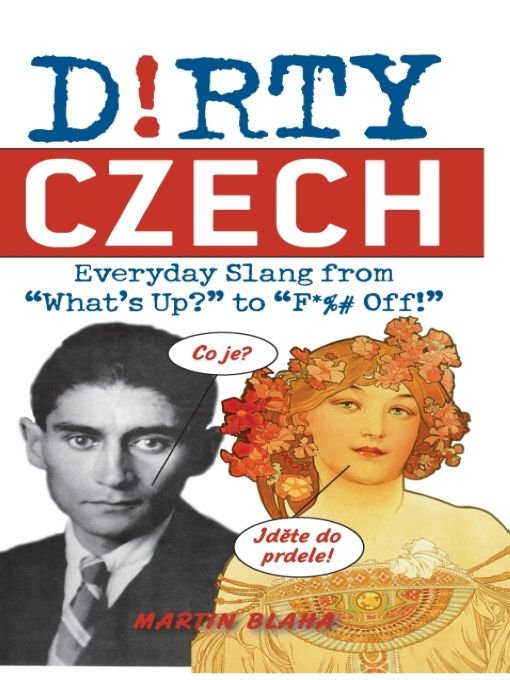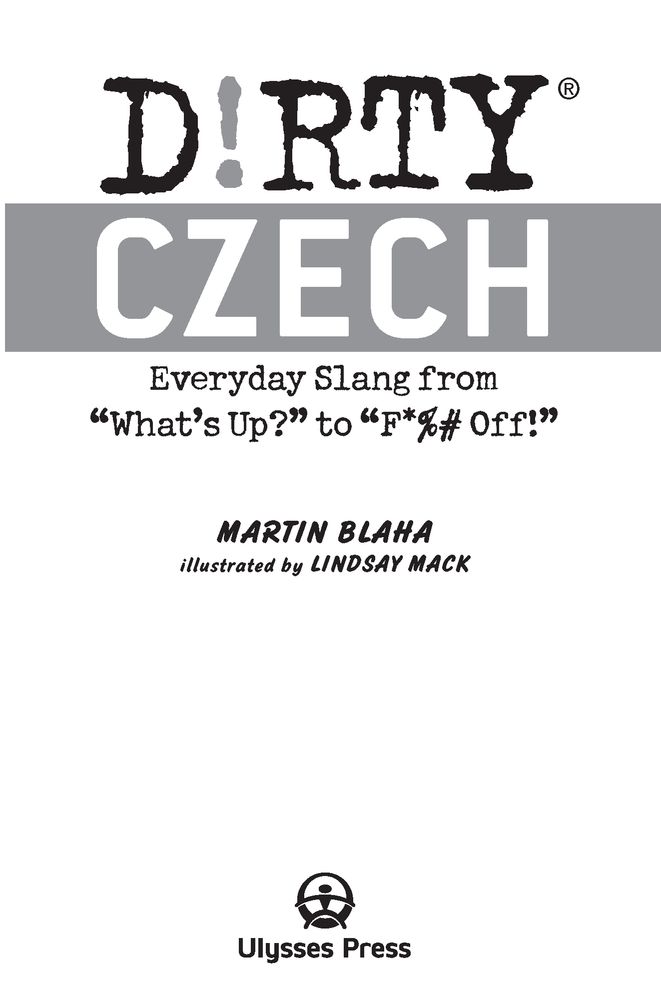Table of Contents
For Jaromra, Hana and Rudolf. Pro Jaromra, Hana a Rudolf.
Acknowledgments
Big thanks go to my great friends Alice, Buddy, Motls and Oscar, to my brother, Petr, and to Charlotta. Love you all.
Thank you Alice, Claire, Kelly and every single person from Ulysses Press who helped make this book happen.
USING THIS BOOK
I wrote this book assuming that you already know enough Czech to get byto read a menu or order some beers and grub at your local hospoda (pub). But whether your knowledge of Czech comes from language podcasts or the college course you almost flunked, slang is usually the last thing you learn after getting down the basics like, The car is blue, and Peter is my friend. So if you wanna learn how to pick up girls in Czech or make fun of your friend for being an asshole the night beforekeep reading. And even if you dont really know Czech, it couldnt hurt to know how to say, Lets drink til were fucking wasted.
This book is set up to be as reader friendly as possible. Each phrase is accompanied by its English equivalent. There are example sentences with key slang words bolded so you can break those words out and use them on your own, whether youre just kidding around with your Czech friends at the club or trying to navigate the beautiful streets of Prague, esk Krumlov or some small rural village. And you can be sure that once you start throwing in some slang, even with that thick accent of yours youll be sure to win some Czech friends. You do have to keep in mind, though, that you cant be using these phrases with any ol someone. Steer clear of older folks, professionals, government officials, cops and people you just dont know that well. And I hate to say it, but ladies, you better really know the people youre testing these phrases out on, because it isnt really normal for gals to talk like this in the CR.
Some basics
Youll be happy to know that boring grammar explanations and conjugation tables are missing from this book (I dont wanna waste your time with stuff you probably already know or dont even care about). On that note, let me just quickly mention a few important grammar-related points and get it out of the way.
TY AN D VY
Czech distinguishes between the formal and informal you. Ty (tykat) is the informal singular, while vy (vykat) is the formal singular and plural. Vy is also used for the plural informal. Unless they tell you its okay to use ty, always address elders and superiors with the formal vy, even if they use the informal ty with you. Be aware, thoughthis book only uses the ty form. I mean, if you say some of these phrases to someone youd speak in the vy with (like, say, the customs official), youre gonna come off as a royal ass no matter if youve got the vy in there or not.
Here are some distinctions between the formal and informal you:
| Formal (vy) | Informal (ty) |
|---|
| Hello. Dobr den. | Hi. Ahoj. |
| Good evening. Dobr veer. | Bye. Ahoj orau. |
| Goodbye. Nashledanou. | Take it easy! Mj se! |
And some possible scenarios:
A hooker to a cop:
I had to give you a blow job so I dont get arrested. I think you can use the wordtyto address me from now on.
Musela jsem Vm ho vykouit, aby jste m nezatknul. Myslm, e od tedka mi mete tykat.
A neighbor to a neighbor:
Mrs. Dana, weve slept together three times already; shall we usetynow?
Pan Dano, u jsme spolu tikrt spali, mem si u tykat?
During intercourse:
Its already in. We can use the wordtynow.
U je tam. Mem si u tykat.
CASES
The Czech language has seven grammatical cases (or declensions) of nouns, pronouns and adjectives. WTF? It just means that the endings of words change depending on their function in the sentence (direct object, indirect object, location, etc.)its like conjugating a verb but with nouns, pronouns and adjectives. When words are listed alone in this book, theyre in the nominative case. However, when theyre given in phrases, they have whatever case ending is necessary for the grammatical context.
GENDER
Czech nouns are masculine, feminine or neuter. Masculine words end in consonants, as in pn (mister), mu (man) and bratr (brother). Feminine words mostly end in the vowels a and e, as in ena (woman) and re (rose), or a soft consonant , as in pse (song). Neuter words end in the vowels o, as in keslo (chair), and e or , as in dt (child).
For people, both adjectives and the past tenses of verbs take different endings depending on whether youre talking about a man or a woman. This book uses the masculine form as the default, or lists it first when theres a male/female distinction.
In formal Czech, adjectives following masculine words end in the vowel , as in ten pn je mlad (the man is young). Adjectives corresponding to feminine words end in the vowel , as in ta re je krsn (the rose is beautiful). Neuter adjectives end in vowel , as in to dt je mal (the child is small). Because this is a slang book, it mostly uses the slang ending for masculine adjectives, ej, as in ten pn je mladej (the man is young), and the slang ending for neuter adjectives , as in to dt je mal (the child is small); both are commonly used in Prague and Bohemia. The feminine adjective ending is always in both formal and informal speech.
PRONUNCIATION
Czech is a very phonetic language (one letter equals one sound), so when you know how to spell a word, you know how to pronounce it, too. Oh, and all Czech words are stressed on the first syllable.
Pronouncing Czech
The Czech alphabet has 40 lettersthe diacritic marks not only mean you pronounce the letters differently, they also make them completely separate letters. The letter is unique to the Czech language, and its pronunciation is so difficult that many children of Czech speakers have to be specially taught how to say it. If you want to try to achieve the sound, its pronounced sort of like an r with zh, as in Dvok (dvorhk). But if you pronounce it as an r, people will understand you.
Heres the Czech alphabet:
a sounds like u in fun.
sounds like a in father.
b sounds like b in bank, but at the end of a word it sounds like p in shop.
c sounds like the ts in bits.
sounds like the ch in church.
d sounds like d in dog.
sounds like the du in due or duty in British English.
d sounds like dj, as in gin and juice. Its not a letter of the alphabet, but its used a lot.
e sounds like eh, as in excellent.
sounds like a prolonged a like in care
sounds like ye in yes.
f sounds like f in frog.




